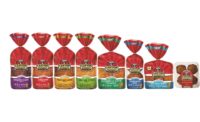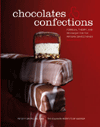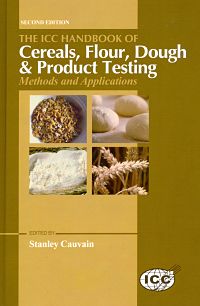Zingerman’s Bakehouse serves up 33 years of artisan baking
The bakery produces loaves of bread, bagels, rolls, desserts, and more.

Exterior of the Zingerman's Bakehouse retail shop. Photo by Liz Parker Kuhn

The shop offers monthly specials of its baked goods. Photo by Liz Parker Kuhn

Photo by Liz Parker Kuhn

Photo by Liz Parker Kuhn

Pies for sale. Photo by Liz Parker Kuhn

Pies and other baked goods for sale. Photo by Liz Parker Kuhn

Interior of the bakery where the Bakehouse's goods are made. Photo by Liz Parker Kuhn

Photo by Liz Parker Kuhn

Photo by Liz Parker Kuhn









For a company that began with only eight bakers and five bread recipes, Zingerman’s Bakehouse, established in 1992 in Ann Arbor, MI, has evolved and flourished. Its mission—“the relentless pursuit of being the best bakery we can imagine”—was strong in the beginning and is very much alive now, the company says.
The Bakehouse is part of the Zingerman’s empire of businesses, including the Deli and Roadhouse restaurants, Creamery, Candy Manufactory, and more, with each business within the community being independently owned. Since it was created, the Bakehouse has grown into a retail shop.
Snack Food & Wholesale Bakery Senior Editor Liz Parker Kuhn was recently able to take a tour of the Bakehouse and learn more about it.
At the start
“At the beginning, we thought we were only going to make bread,” shares Amy Emberling, managing partner, Zingerman’s Bakehouse. “Things evolved and changed, and now here we are, 32 years later, with a thriving retail business.”
The Bakehouse wanted to make artisan bread and traditional pastries, which is still its primary bread and butter. In 1992, the Bakehouse existed in the spot where the other Zingerman’s sister businesses are today—the Creamery, and the Candy Manufactory/coffee shop—but it was the only building there. About 10 years later, Zingerman’s Creamery (purveyor of fresh cheeses, dairy products, and more) opened its doors. The stores are all located on the south side of Ann Arbor, technically in Pittsfield Township, MI, in an industrial area.
“It’s been a remarkable uphill battle to have people in Ann Arbor sort of know we exist,” remarks Emberling.
Meanwhile, the Bakehouse does well for itself: it welcomes about 4,500 customers per week, and the retail shop opened in 1996. Around 2001, the Bakehouse started making fresh soup and sandwiches daily as well. “
"There were a lot of people working around here, and there are still not a lot of places to eat. Also, it was a way to feature the breads and help people try a bread that maybe they wouldn’t buy a whole loaf of—but could try on a sandwich,” Emberling explains.
Base of operations
The bakery, which operates from 2:30 am to 8:30 pm daily and is attached to the retail shop, uses a mix of traditional and mechanized methods, and sources organic flour, plus also mills its own grains. Customers at the retail shop can see the bakers working while they shop for breads and pastries.
There are no shifts at the bakery—“it’s just sort of continuous, [because] there is mixing going on all the time, with different items being baked,” says Emberling, adding that many of the Bakehouse’s breads are naturally leavened, and a lot of its flavors come from a long fermentation process.
“In order to have that, you want a warm environment, but you’ll also want a relatively cool dough coming off the mixer,” she notes.
A lot of bakeries similar to the Bakehouse will have a proofing room, says Emberling, but they do not, because the bakery is kept relatively warm. The Bakehouse uses a water chiller to maintain cool dough temperatures for its naturally leaved breads, and it sources organic flour from Bay State Milling and Janie’s Mill, although the company tries to buy local as much as it can.
The business also has two stone mills of its own. Every day, it mills 300 to 800 pounds of grain itself, and it works with two family farms—Centennial Farms, in Michigan, and grain from Frankenmuth, which it uses for its cookies, which are 100% whole grain.
“We’ve developed some really nice relationships with farmers in the area; [they] wanted to move into growing organic grain, and wanted a relationship directly with a baker or someone who could process [the grain], without having a ‘middle man,’” Emberling explains.
As the Bakehouse’s bread comes out of the oven, it gets put in the company’s sorting room, and then gets ready for delivery. The company delivers three to four times a day in Ann Arbor. The bakery has over 100 wholesale customers and a large team of 140 people, including delivery drivers.
“That was an effort, [at first], because we didn’t have retail,” Emberling says. “We wanted to get the bread to the people that were selling it to customers as quickly as possible during the day, and then it became part of the service we provide. We have four routes that go out every night.”
The Bakehouse also makes its own pastries onsite. The pastry kitchen team will measure out ingredients for various recipes, using ingredients that are free from preservatives. The team does not use any mixes, and the ingredients are measured out during the day before baking.
“We do our baking just like you would at home—we measure out everything at first,” says Emberling.
“We bake to order, so we don’t have a lot of inventory [on hand]. That might be somewhat different from other places. Customers have to give us their order two days before they would receive [the product]—for example, yesterday [on Sunday], we got the order for Tuesday. Today is Monday, we are making [the products], and they’ll get delivered in the wee hours of the morning,” she explains.
Community of businesses
Although the Bakehouse is one of several independently owned businesses within the Zingerman’s Community of Businesses—a collection of over 10 mostly food-related businesses in and around Ann Arbor—it operates cooperatively, with regular meetings to discuss business issues and agree on standards. Although each business within the community has different owners, the businesses work together towards common goals.
Emberling, as managing partner, owns 75% of the bakery, and the founders of Zingerman’s Deli own the other 25%. This is how all of the Zingerman’s businesses work, she notes.
Patrons may see Bakehouse products at the deli, for example, but the Deli actually purchased those from the Bakehouse originally.
“We all work cooperatively together—every two weeks, all of the partners [including me] discuss different business issues that concern all of us, so we can present the same face to the public,” says Emberling. “At the bakery, we decide on pricing, and we decide on the recipe, but we all agree—[for example], what’s the service standard for the whole organization? The look and feel? Things like that.”
The other businesses, including the Candy Manufactory, all have retail shops connected to the production areas, similar to the Bakehouse, Emberling adds.
Baking school
The Bakehouse launched its home baking school, Bake, in 2007, and it offers 14 classes per week, as well as two classrooms dedicated to teaching baking skills. Classes include more than 60 different bread, pastry, and cake hands-on baking and cooking classes.
A handful of its offerings for this month include Opera Torte, Cinn-Full Cinnamon Rolls, Getting Eggy With It Breakfast Class, Sweet & Savory Galettes, and Chocolate Fix. Classes are usually four hours long, and are $135, with the option to reserve a spot on its website.
Bake also offers virtual classes, where consumers can enjoy baking in the comfort of their own kitchens, and in-person classes for kids, such as a Kids Camp – Baking Basics, which will be offered this summer (June, July, and August).
For adults who want something a bit more immersive, it offers BAKE!-Cation Weekends, which includes breakfast and lunch each day. This June’s upcoming BAKE!-Cation Weekend includes an intensive weekend of baking and demonstrations of some of Zingerman’s favorite breads, including Pretzels Buns, Onion Rye, Spicy Chile Cheddar, Grissini, Sesame Semolina, and more.
Products
On the day when Snack Food & Wholesale Bakery visited, one of the Bakehouse employees was preparing to make a savory Hungarian strudel of sorts, called a réte. Rétes often feature a flaky, layered dough with sweet fillings like fruit or cheese, and Zingerman’s take on it included potato and bacon.
On its website, the Bakehouse classifies its products into four subcategories: Bread, Sweet Stuff, Ready-Made Cakes, and Other Goodies. Its Classic Bakehouse bread includes an 8-grain 3-seed bread, white bread, “Better than San Francisco” sourdough bread, challah, chile cheddar bread, chocolate cherry bread, chocolate chunk sourdough bread, cinnamon raisin bread, country multigrain bread, and more.
The Bakehouse’s special monthly offerings for March included black olive farm bread, Bailey’s and chocolate cupcakes, a “flipped out” onion bagel, Irish brown soda bread, New Yorker rolls, Chernushka rye bread, and Hamentaschen cookies, for the Jewish holiday Purim.
The Bakehouse’s continued growth, as well as its passion for innovation, should ensure that it will be baking for years to come.
Looking for a reprint of this article?
From high-res PDFs to custom plaques, order your copy today!



















